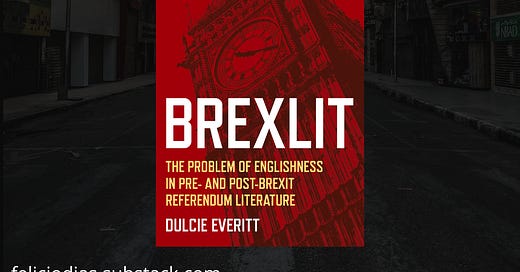Note: This is part of a series of interviews I have conducted with researchers and writers for my postdoctoral project, which revolves around fictional discourse as a language theory. These conversations aim to address important topics for both language learners and experts, highlighting how contemporary writers have used language and its heterogeneity as the driving force of their work. As a result, it is essential that we navigate global issues such as immigration, identities, Brexit, and other worldwide concerns that some writers and scholars have eloquently explored. The core of my page is to engage with intricate debates on language and theory, while also giving voice to researchers and writers who have devoted their time to investigating language through various lenses.
[transcript is available ——- Questions Dulcie answered and language box at the end of the text]
“It was the worst of times” - A chat with Dulcie on Brexit, literature, Britishness and Language.
"Literature is intended to interpret the world in which we live. Like all forms of art, literature offers us an exceptional opportunity to step outside of our lived experience and to reconsider our relationship with the world”
Dulcie Everitt- Brexlit - The Problem of Englishness in Pre- And Post- Brexit Referendum Literature [link to the book]
It was the worst of times - Brexit and the circuit of language
"it was the worst of times" - Had I not made a conscious effort to read Charles Dickens at the university, I wouldn't have been able to fathom what Ali Smith, a renowned and widely awarded Scottish writer, intended to convey with the very first lines of Autumn - an ingenious, meticulously crafted fictional book that sheds light on the heightened tension during the Brexit referendum in the UK.
I have chosen this quotation as It appeals to me as the quiddity of Ali Smith's writing - a kaleidoscope of literary references assembled to illuminate the grim atmosphere in the UK during the referendum on whether the UK should leave or remain in the European Union. Hadn't been for her gripping and boundary-pushing narrative, I would never have deepened my knowledge on Brexit. If I am being honest, It is thanks to literature that I have become more open-minded and attuned to topics that ignite a fire within me. Literature has certainly paved the way for more in-depth analysis of sociocultural and historical-linguistic phenomena.
But why Brexilit [Literature on Brexit]? This was the very first question I felt compelled to ask Dulcie, and she responded eloquently. As for me, what draws me to literature is the openness to language experimentation as a way to explore the circuit of language we inhabit. Although literature does not aim to be a therapeutic product, our minds are undeniably broadened when we set out to explore a literary work and seek intricate ideas embedded within its main plot. [Aside from my biased view on the concept of literature, I reckon it does have this effect on us at times.]
Nonetheless, what has always stood out for me when it comes to literature is the willingness of some writers to interrogate the very roots of their identity and its intersection with language. A language is indeed the backbone of a country, and it feeds people's imagination about their immediate and pre-label norms to establish a firm and solid connection with a national identity.
What draws my attention me in works like those of Ali Smith, and in many others that Dulcie brilliantly analyzes in her writings, is the attempt to dismantle entanglements and presuppositions of a natural bond with one’s own language: There is no homogeneity when it comes to language - There has never been, and there will never be.
Truth be told, Language is essentially a network of heterogeneity, filled with regional and social variations. As part of my queries, I have been wondering why there is a constant drive to eliminate what is considered non-native, once natives are, by nature, strangers in their own language - once language is heterogeneity and cultural translation does not cease to happen.
One of the most brilliant takeaways from Brexit Lit is the emphasis placed on the impossibility of thinking of a language, such as English, and disregarding the issue of nationality and its connection to the institutions that both uphold and dismantle it, such as the literary institution. Guiding language instruction in a way that seeks to disassemble the presupposition of a natural bond with one’s own language is pivotal.
I have gathered a boatload of novels for my postdoctoral research, where language is the crux of the problem due to its heterogeneity and the disorientating effect produced by its intricate inner multiplicity. Thus, the notion of homogeneity supported by a common language is an illusion.
Language is a network of heterogeneity; hence, translation becomes essential, not only between different languages but also among the national, social, regional, and historical variants of the same language. When we speak or attempt to convey any action or linear discourse, a form of translation is already taking place. Translation doesn’t only occur between distinct languages — on the contrary, the first operation takes place in the relationship between thought and language, where language itself relentlessly attempts to linearize thought, producing closed, objective images for communication. In this way, identity is shaped by the language we speak, which often comes to us as a pre-fabricated reality that we seem compelled to accept.
Therefore, knowledge of a language implies not only mastering speech, writing, and communication but also, and perhaps most importantly, the capacity to engage with everything that resists translation — those knots of irreducible singularities that lack any national content. This directly relates to how we are translated as “other” when we speak a language, and how this places us in the position of the foreigner.
Yet, it is crucial to keep in mind that there is no presupposed, immediate natural bond with language. The more you begin to operate within a language, the more this repertoire transmutes, and we disassemble the notion of native linguistic ownership. This ownership is an illusion, a philosophical idea of possession — not only does it not exist, but the words we speak are older than we are; we will never truly “own” a language, nor is there such a bond.
Having this in mind, Dulcie and I sat down for a thought-provoking conversation on a wide range of topics. She gave us a primer on Brexit and the whole referendum - its process and aftermath -, diving into sensitive topics that intersect with Language, Identity, immigration and global issues. Her book is a masterful exploration of the intersectionality of Brexit and our social fabric.
Regardless of our geographical space, all the novels Dulcie and I have broached are astute fictional texts that serve as a time capsule, attempting to deconstruct and reconstruct globalised identities and put us all on equal footing. We went through them with a fine-toothed comb, and I hope we were able to spark your curiosity about such important topics.
Works cited
Brexitlit - The problem of Englishness in Pre - And Post Brexit Referendum Literature - Dulcie Everitt
Autumn - Ali Smith
Stubborn Archivist - Yara Rodrigues Fowler
Chavs -The demonisation of the working class - Owen Jones
The Northern Question- A history of a divided country - Tom Hazeldine
Questions - they are not in the right order.
I stumbled upon your work completely by chance while I was researching literature produced by diasporic writers in the UK. Your book is not only a gem but also incredibly timely for my research!
I recently completed my PhD in Brazilian literature [UNICAMP, brazil] , where I explored language and history. Now, I'm collecting material to put together a postdoctoral project focusing on literature produced by diasporic writers, particularly where language, accent, and immigration are central themes.
At a certain point in the book, the main argument hinges on the fact that the discussion of Englishness inevitably draws our attention to how history and liberal ideas have worked together to reshape the contemporary manifestation of English nationalism. Not only do I agree with this, but I would also add that the discussion is further broadened by the multidisciplinary scope of analysis you employed throughout the book, encompassing politics, language, history, economics, and literature. You utilized multiple discursive devices to both build and sustain your main argument. Having said that, how did you become interested in this topic? How did you manage to navigate this vast array of references? And, last but not least, why literature?
I was particularly dazzled by the conversation you engaged in with the novels you chose. If memory serves me correctly, in Part 2 of the book, you point out that the literature grappling with Brexit is incredibly extensive, and you didn’t aim to cover it comprehensively. Among the works you explored, Ali Smith was the one I had read before encountering your book. How did you go about selecting the books to be explored? What was the process like? Given the evolving literary landscape, what other books would you include in this pantheon of fictions concerning Brexit in 2024? Has anything changed regarding your list?
I know Brexit is a vest topic, and it would easily split into many other pieces. What criteria did you have to use to determine the scope of your project?
How do you see authors grappling with the idea of Englishness? Do you believe they convey that Englishness in the UK is more complex than in other contexts? How have you reflected on this matter?
How does Brexit influence the old collective imagination of being British—in the purity of the term—while ignoring its historical issues of formation and colonization?
Despite the brilliant writing and solid arguments in the architecture of your book, a startling element that caught my eye—and I would say it provoked me to reflect on many relevant issues—was your exhaustive and brilliant analysis of England, England. You argue that Barnes's response is to satirize the inclination to define Englishness in isolation from the UK's neighbors. Through this mechanism, he lays bare the pernicious argument embedded in nationalist discourse, which frames identity as a protection from outsiders.
Do you think it's possible to revise this dangerous genealogy while reading the book and consider the pieces of England as being assembled by multiple elements that surpass the UK, such as the increased influx of immigration, multicultural citizens, and the advent of technology, which bridges the gap between local traditions and global cultures?
I was deeply impressed by a book I’ve recently read, especially because I believe it deals with quite similar topics as yours. Although it strikes up a fruitful dialogue, it was written in a different moment. The book is Chavs by Owen Jones. I mention it because it's interesting to see how some problems we’ve been grappling with are intertwined with other perspectives. At the very beginning of the book, he recalls something he said in the past about the danger of a savvy, new populist right emerging—furnished with knowledge and equipped to talk about the working class without mastering the subject, but simply offering reactionary solutions to working-class problems. Rather than focusing on the deep-seated economic issues that truly underpin working-class struggles, this populism uses certain tactics to draw attention to topics like immigration and identity. Do you see Brexit as being embedded in this process?
In the days leading up to the Brexit referendum result, Zadie Smith, who has produced contemporary masterpieces deconstructing Englishness and multiculturalism, composed a text titled Fences: A Brexit Diary. I believe it serves as a continuum of ideas, like a container in which she aired her views on Brexit day by day. In the aftermath of the result, she read pieces by proud Londoners speaking of their multicultural, outward-looking city, so different from the supposedly xenophobic places up north, according to them.
For Zadie, those who truly lived in a multicultural city were people whose children were educated in mixed environments and lived in mixed neighborhoods. She often found herself thinking that for many Londoners, the supposedly multicultural and cross-class aspects of their lives were actually represented by their staff—nannies, cleaners—or perhaps a handful of Nigerians. Yet, she believes these realities were overlooked for years, and one of the consequences of Brexit was to finally and openly reveal the deep fractures in British society that had been thirty years in the making. In her view, this is a startling reality, one that must be confronted by all of us, not just those who voted Leave.
What other fractures has Brexit revealed?
Have you found any of these consequences while researching and writing your book? How has Brexit affected the concept of multiculturalism?
Your book provided a lot of food for thought, especially regarding sensitive and highly contemporary debates such as immigration. Even though the driving force of your book is clearly the debate surrounding Brexit—its historicization and consequences—I couldn’t help but think about recent events in the UK, like the racist and fascist riots that have erupted across the country. Rioters used a social catastrophe, the violent stabbing of girls during a dance lesson, as a scapegoat for racism, sparking criminal and violent riots on a scale we hadn't seen before.
Despite the current consequences of Brexit in relation to immigration, do you believe it’s possible to use books and discussions about the problem of Englishness to reconsider the role immigration has played in rebuilding the UK?
I have read a boatload of books on immigration, from the Windrush case to Asian migration to the UK. The way I see it, there is a profusion of texts aimed at upending the debate, offering readers a more left-wing perspective. I feel that there has been a surge in the amount of debate on mass and illegal immigration, but it seems to have taken an unexpected turn, especially after Brexit. While there are plenty of problems concerning immigration, do you think that Brexit literature may help us carve out opportunities to examine this issue in a more in-depth way, so that we can deepen our knowledge and better historicize such an important topic—particularly for immigrants themselves?
Interesting Language used during the conversation
It captures a moment / feeling
Diverse and global place, interconnected
Pivotal moment
Dinner table conversation
Figure out what I want
It’s raw
They did it as a kind of processing exercise
Serve as time capsule
Reread them and revise the depth of emotion
Something that was fresh and emotional, there is a lot of anger, upset
If I WROTE IT now it would e more measured
Easier to have distance and be dispassionate about it
I don’t want get the quote wrong
It was deeply unpleasant
I want flag this because I was..
He dint get what they want out of the vote
A large part of population want it
Divisive tool and polarizing thing
Perspective of the losers
The best is yet to come
To capture that really raw feeling
I’m not arguing that..
But it’s calculated, especially with Brexit, very tailored, appealled to the people
After five minutes had passed, the noise ceased
There’s no agreed interpretation
No collective imagination
Keep a stiff upper a lip
What comes first, chicken and egg
When the British empire started to disintegrate
The nationalism they experience is an opposition to the British colonialism
National identity started to get a little bit trickier
This is an unique expression
There is nothing underpinning it anymore
A referendum of this scope…
We spread our language, culture and tine habits
The mythology around britishness was build up during the empire in terms of this exceptionalism.
The control and the power that rubs off
Collective imagination of being exceptional
Distinct national identities that England didn’t seem to have
Umbrella of everything
We didn’t have control over our own decisions
An expression of this exceptional identity
Intersectionality of how we imagine ourselves, and then, that fitting into a kind of pre-establish labels or norms. Deconstructing and reconstructing Globalized identities acknowledge things you are talking about.
What does it even mean to be English? We didn’t just crop like growing up out of the ground.
Mixed raced families - not being enough british
Race in America post-trump
You aren’t white enough to be America












Share this post